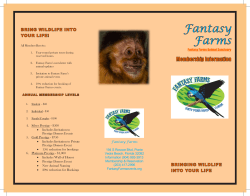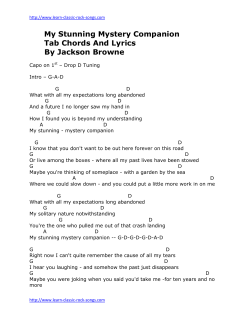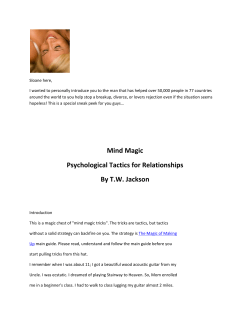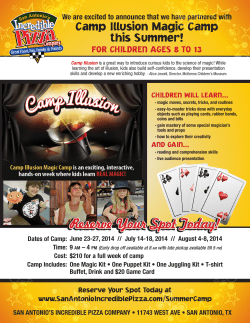
Document 153425
How To Write A Fantasy Short Story Frank P Ryan Art by Mark Salwowski For The Fantasy Book Review Short Story Competition Mark, Mo, Alan and Kate and the magic stone bowl portal from “The Snowmelt River” Page 1 In many ways a fantasy story is just like any other story, with a single exception. It has to contain an element of magic. Maybe it will be an adventure story, though it could just as easily be a very ordinary kind of story that contains that all-important magical ingredient. Whatever works for you! Maybe you’ve liked the magic of Harry Potter, where the story is set in a school for magic. But it could also be that your story is set in a very ordinary school where somebody, or something, extraordinary is going on. Or it could be a dark story, with vampires, or ghosts, or witches, or goblins – or all of them. It could be a lighter tale, like those of Terry Pratchett’s Discworld, with bumbling wizards, whose spells are constantly going wrong, or a friendly character known as Death, who has a fondness for curries. That’s the great thing about writing a fantasy story – it’s fun to write and your imagination can soar in so many different ways. But if it was that easy wouldn’t we all be as rich and famous as J K Rowling and Terry Pratchett? Hey – so okay! There’s more to writing a good fantasy story than just the fun aspect. You have to be able to write a good story. And while there is an element of hard work to this, I shall now show you that the hard graft of writing, yes really, and even the process of learning how to go about it, can also be fun. Recently a 12-year-old living in Canada asked me what made me want to become a writer. I could have said “magic” and, in a way, it would have been true. A more practical question is this: Why would anybody, even those of you who have no desire at all to become professional writers, want to be bothered with learning how to write? In fact, people – anybody and everybody – need to be able to communicate experiences, or ideas. Writing is a very good way of doing this. It links imaginations. When you read a book or a short story, or a magazine article, your imagination really is making contact, one-to-one, with whoever wrote it. That makes writing a very personal thing; and it also makes reading more personal and exciting than, maybe, you thought about before. Just think about when you read a book, how you have to imagine characters and settings for yourself. That involves your own powers of magic. And it’s why the film, if a film follows a book, can sometimes be a little bit disappointing. You have already created the world of the book in your own imagination and the film shows it through somebody else’s imagination – the film director’s. Page 2 Hey – and don’t get the idea that writing is only about fiction. Writing is about anything that goes down on paper, or these days into an electronic format, whether novels, short stories, articles in magazines, or on-line… even your own personal emails! Hold on a minute. So how, then, do you define a writer? Well, if you check your dictionary, the answer may surprise you. A writer is a person who writes. And that means you’re a writer already. Of course not everybody makes their living from writing, but it’s obvious that we all need to be able to write. The smarter you are at doing this, the more successful and satisfying your life is going to be. Job applications, essays, lectures and presentations won’t worry you as much as they might otherwise. You’ll be rootin’ an’ tootin’ with more confidence, because you’ll have a better idea of how to go about it. Am I kidding you? I don’t think so. Once you grasp the essentials, you’ll find that the very process you go through to write your short story applies to quite a lot of that other stuff you need to get on with in your life. I should know. I learnt the hard way. I began as a doctor and scientist, writing and reading scientific articles. I then took the quantum leap to writing fiction. From there I returned to writing non-fiction books. And now, I have gone full circle to writing fiction again. I have learnt through my own helter-skelter experience that the principles are very much the same for all kinds of writing. But here you are now, thinking about writing a fantasy story – and all for yourself. Nobody is forcing you to write this story. Nobody is telling you what to write about. All I suggest is that you think about it as being fun. And at the end of it you will have learnt some neat tricks about writing that will help you understand the books and articles you read, whether for your own enjoyment or to help you analyse job applications – even to answer those bothersome questions in examinations. But I have never been any good at English! That doesn’t matter. I was no good at English at school. I’m not proud of it, far from it. But I was shunted into the science stream and so I had to drop English literature at a stupidly early level. This was a disadvantage to me later and I had to catch up on what I had lost. So, even if you think you are not so Page 3 hot at English – if, like me, you have never received a single good mark in an English essay – you can turn it around. People may be surprised by this more articulate you. They might even ask you what you’ve been up to. So take a tip from the late comedian, Peter Cook, who, when asked these same questions on his return after many years absence from the scene, remarked: “I’ve been thinking about the world and everything in it.” Improving your grasp of writing might just help open up the same world to you. So, okay, in the meat of this article I’ll be giving you some helpful tips, based on a lifetime’s experience of the ups and downs of being a writer. I’ll be focusing on short stories, because you are being invited to write one. You’re under no obligation to do so, it’s entirely up to you, and there are very few rules. So why don’t you just make yourself comfortable, open up your imagination and have a little fun with words. The warrior Ainé, a Kyra of the Shee, from “The Snowmelt River” Page 4 … and what better place to start than the very beginning! Let’s recruit the help of that well-known military gentleman – General Principles. First a couple of questions – is there is a particular story you want to tell – and why this story? The answer to that question will become the “engine” that drives your story. • The engine. When a writer starts to think about creating a story, he or she will usually have something in mind that they are interested in, or that they feel strongly about. That interest, or depth of feeling, will give your story the oomph to get it moving. It could be a sad or a happy event, or just something so wacky it makes you laugh. When the great Charles Dickens wrote his books about Victorian London, the engine inspiring him was his outrage at the ill treatment of the poor. He had experienced this as a boy when his family was incarcerated in a workhouse. As you might imagine, the experiences of the boy haunted the imagination of the man, so it became a very powerful engine indeed – so powerful it carried him through all of his great works without ever tiring of it. • Pay attention to ordinary things. Look at what is happening to you as part of your ordinary life. Naïve writers think that stories have to be about extra-cool people and events, but the very opposite is often true. Ordinary life has a magic of its own, although it is often easy to miss it because we are so accustomed to it. You can use the way that people talk, for example accents and dialect, to tell the reader a lot about them. Look at how Jay Frost talks in Neil Gaiman’s The Graveyard Book, and see how, and why, it helps paint the character. Imagine that you are leaving for school, or in the process of actually walking to school, and try to describe all that you are witnessing to an imaginary friend inside your head. You don’t need longwinded words. What you do need is accurate words – words that neatly capture what you are seeing so this friend can share your experiences. And maybe you will think of how something magical might enter this ordinary world, and become the spark that will fire your imagination. • Think about how you notice the world around you. You don’t just use your eyes. You also touch things and feel them through your fingers, or sense them on your body, like a cold breeze on your face. Page 5 • You smell things like flowers, or freshly cut grass, or particularly whiffy cow dung, or the breakfast cooking when you’re crawling out of bed in the morning. You use your ears a lot more than you might realise. For example when you hear voices approach, or a car coming from behind, or the sounds of birds in the garden or the countryside – or the tone of voice in which somebody is talking to you. Do you associate a grandmother with the taste of the food she cooks for you? How, for example, do you really recall your close friends? Do places stick in your memory because of a sound, or a song, or some local accent or way of talking? Could you capture this in a simple accurate sentence, or example? What is it that immediately springs to mind about your best friend – or your worst enemy? Is it a look on a face, a gesture, a way of walking, a sound, or even a smell, a single act of kindness or cruelty? Have fun exploring this world of the senses. It will develop your powers of observation. • Make your own dictionary. Whenever you come across an interesting word that you yourself would never think of using, add it to a dictionary file on your computer. I’m not talking about big or fancy words, I’m talking about what I call “power words”, like “spectral”, or “astral”, or “Quixotic”, or “numinous”. Words that carry powerful associations just by themselves. There are special fantasy words you might like to collect, like “incantation”, “malengin”, “eldritch”. Look up their true meaning in a dictionary and start making your own brief fantasy dictionary, maybe aiming at a couple of dozen words. You could then use a few of these during the writing of your fantasy story. The very meaning of the words themselves – like the words “Mage”, or “enchant” – might even give you some cool ideas for a story in themselves. The better your vocabulary, the more word power you have, and the more powerful you yourself become. But don’t get carried away and use obscure words just because they’re obscure. That only makes a writer seem uncool and boring. • Body language. People communicate mainly through words, but also through gestures, like hugs or handshakes, or looks, good and bad. Look at how people communicate through gestures. The human face is a communication device all by itself. Think about the meaning of the expression “body language”. We pick up on other people’s body language automatically, but in writing about people we need to find simple ways of describing this in words that others will instantly recognise. What kind of a body language would a warlock, or a witch, display? It’s kind of interesting to realise that you can influence people, or a situation, just through body language. Think about it. Can you recall people, in real life or in the media, who really go to town on Page 6 body language? Watch your favourite comedians on television, with the sound switched off, and see what you learn from their faces, and their body language. Once you start to notice stuff like that, and even more when you start putting it into words, you’ll get better at it. And think how useful it might be later in life when you have learnt how to interpret other people’s body language – like in a job interview or a romantic situation. • A situations diary. You might start by writing just a single paragraph about some situation you recall from earlier in the day. You will naturally write this from your own viewpoint, which, in formal terms, is called the “first person”. All right – but now I am going to suggest a new slant on this. After you have written it from your point of view, try writing the same situation from a different perspective – what fun to see the same situation through the senses of maybe a rival, or even an enemy! You could even inject a bit of self-deprecatory humour into it if you imagined it wasn’t a person at all but maybe a dog, or a horse, or a beady-eyed crow. What if the beady-eyed crow took rather a cynical view of life, like a tetchy old granddad or grandma? In moving out of the normal frame of reference, you have already taken a step towards a more fantastic perspective. What’s the betting that this beady-eyed crow would have a body language of its own? • Moods. Some situations, or people, cheer you up and others make you feel sad, or angry. Moods, like emotions, are very powerful things for a writer. Good writers know how to control the moods, and emotions, of their readers. See if you can think of ways in which you can influence the mood or emotion of a reader. Think for example of the weather. Think how the same event would look very different on a cold, wintry day as opposed to a sunny spring morning. This kind of “ambient” world will heavily influence the mood of your story. Tolkein evokes moods brilliantly. For example he will get you to sympathise with his Hobbits by making them lovable or funny. He also conjures up haunting images of the passing landscape that invade your mind and control your mood and emotions, thus preparing you for what is about to happen. Do you want to make your reader feel good, or apprehensive? Does the body language of your character, or characters, help reinforce the same ambience? People will say that they can read a message in people’s eyes, but eyeballs – other than the size of the pupils – don’t actually change. It’s the face around the eyes that actually transforms. Why don’t you look at yourself in the mirror and pull faces – get sad, be angry, laugh, cry – see for yourself how faces have a complex, and very interesting, body language of their own. Page 7 • Hidden Themes. Stories often have a more subtle theme running through them. I don’t just mean the storyline. This may well be the true engine behind the telling of the story. This hidden theme can also be integral to the characters and their motivations within the storyline. Sometimes even the writers themselves don’t realise that this theme is present until after they have written the story. Think about the books or films you have really loved, and try to recall what it is about them that made them so special to you. Maybe you sensed and identified with this hidden theme without ever realizing it. In Lord of the Rings, the hidden theme is the death of magic. Tolkein uses a metaphor for this when the elves, and Frodo, get on board the fleet that is “sailing west”. In my own fantasy, The Snowmelt River, the hidden theme is metamorphosis – the fact that beings can change, dramatically and radically, like a caterpillar turns into a butterfly. I imagined that people could metamorphose in this way. • Hopes and fears. Maybe you long for an experience that would normally be out of your reach? Maybe your life hasn’t encouraged you to think you can write anything that would interest anybody else? Maybe there has been pain or hurt in your life that you think about a lot? Maybe you have been bullied, or told you were unattractive? Maybe you suffer from a disability? With hopes and fears such as these, it’s far better to let them show in the plot and dialogue than just to state them. How different would the perspective of a scene be if it was through the senses of a young girl in a wheelchair? But don’t just say she’s in a wheelchair – have her push the wheels round, or stare up at somebody from the sitting position, or reveal it in conversation. Now you’re getting the knack of it. Maybe somebody has told you that you weren’t capable of writing a word that might be useful or interesting to anybody. Now’s your chance to prove them wrong. Although you might not have thought of it this way, deeply felt experiences, whether for good or for bad, are food and drink to a writer. Just writing about it may feel satisfying. In the opening chapters of The Snowmelt River we discover that all four of the main characters have suffered bereavement, a sense of uselessness, pain – even physical abuse. This unites them into a profound friendship. That theme, although not always directly expressed, drives everything they do throughout every page of the book. • Ya gotto have rhythm. Did you know that language has a kind of rhythm to it? This depends very much on the way that sentences are constructed, with short and long sentences in the right kind of order or sequence within a paragraph. Why don’t you try reading a paragraph or two of your favourite book out loud and you’ll see what I mean. You always hear Page 8 rhythm better if you speak it aloud. Most writers of short stories actually speak them aloud at stages as they go along. You’d be surprised what you gain from this. Action scenes will often be written in a series of short, abrupt sentences. More flowing scenes will involve varying the sentence length, to break up the flow, and so on. By far the best way of getting a natural feel for the rhythm of language is to read books by people who know how to write well. Just by reading them you will naturally soak up a kind of feel, an instinct, that will help you get into the groove of writing well yourself. • Thinking up characters. Creating vibrant, believable characters is essential to fiction. So think about your characters for a while before you put anything onto paper. Get ideas from interesting people you know, borrow a mannerism from here and there, a feeling about somebody, the colour of hair, a telling small habit. See your characters in your mind’s eye, including their body language. When they are moving around inside your head, doing things that surprise you, you know that you are ready to start writing about them. I have one final tip to help get you up and motoring. • The narrative hook. I never cease to be amazed that other people will sit down and bother to read from cover to cover a book I have written. It’s kind of weird, but also a very satisfying feeling, that they will have the patience and interest to do this. But if you want to seduce your readers into reading your story, you must capture their interest right from the start. This cunning strategy is called the “narrative hook”. One of the most famous of all narrative hooks is the opening line from the novel, The Go-Between, by L.P. Hartley, which reads, “The past is a foreign country; they do things differently there.” Think about why this is so powerful; why, for example, did Hartley use the present tense? Assuming you have decided what your fantasy story is going to be about, and you already have your characters popping out of your head, do you have something you could put in the opening paragraph – it could be a strange question, or a minor observation that seems out of place, something that is likely to startle or intrigue your reader and make him or her want to read on? You do? The magic has begun… Page 9 If you would like to put a question to Frank or Mark, or would like to discover more about The Snowmelt River or the art of Mark Salwowski, visit www.swiftpublishers.com www.salwowski.com A Fir Bolg battleaxe, from “The Snowmelt River” All text copyright 2010 Frank P Ryan – All images copyright 2010 Mark Salwowski Page 10
© Copyright 2025





















